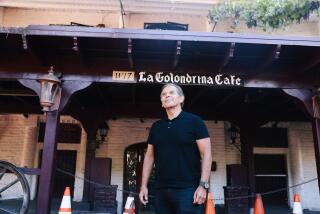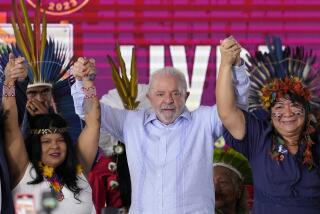Old Politics Prevail in the Philippines
- Share via
MANILA — William Howard Taft arrived in Manila at the turn of the century to head the Philippine Commission that was to decide the future of the country. He met insistent demands from the Filipino elite for immediate independence. Their argument: For self-government all that was required was a minority capable of ruling and a majority willing to be ruled, both of which the Filipinos had.
Taft consistently rejected this elitist concept of independence and insisted on preparation and schooling in democracy. And the great instrument of this preparation was to be education --free public education according to the American model.
Not all American administrators agreed with this emphasis. One with long experience in the Far East argued that without a solid, balanced and well-distributed economy, education would accomplish little and Philippine democracy would be an empty shell. But a solid and well-distributed economy would have meant dismantling the landowning system, alienating the elite upon whom the Americans were relying to pacify the masses and perhaps making the nation ungovernable. So social reform was put on the back burner, and a development policy, with emphasis on agricultural production for export, in fact strengthened the traditional system.
As elections were introduced and the electorate widened, Philippine politics became essentially power struggles among factions, each headed by a prominent and usually wealthy individual supported by his dependents and followers. Issues and policies had little to do with it all; the struggle was for prestige and power and control of patronage, in the style of the machine politics of American cities of the period. The key to the system was precisely the lack of a solid and well- distributed economy, turning on the economic insecurity of the little man and his hope that support of a winning candidate would bring him some small immediate reward--a job or a patron to appeal to in time of emergency.
Thus Philippine elections have been compared to cockfights. The bystander enjoys the excitement while trying to keep out of the way lest he be hurt; he may gain a peso or two by betting on the right cock but he really does not expect it to change his life significantly.
The Jan. 18 election for local officials resembled a cockfight in another and more lethal way: As of Feb. 1 there had been 146 killed in the campaign and its aftermath, 42 of them candidates. The escalating violence suggests the high stakes--in power and economic activities--for the candidates and, possibly, the entrance of the communist New People’s Army into the arena, either in support of chosen candidates or simply as guns for hire.
What does the outcome of the election suggest for the future of Philippine politics? Certainly it indicates that in many places the old system is alive and well after the hibernation of the Ferdinand E. Marcos years. Many winning candidates are members of old political families. Others are relatively new names but playing the old game of power politics.
There were also some members of political “dynasties” who went down in dramatic defeat, including relatives of President Corazon Aquino, Vice President Salvador H. Laurel and, according to incomplete results, relatives of the Muslim warlord representative Ali Dimaporo. This may signal a certain turning of the tide and a resentment against the dominance of some clans, but it does not mean that those who defeated them represent a new, issue-based politics.
The local elections were seen as laying the organizational groundwork for the presidential election of 1992. Potential candidates and the emerging political parties struggled mightily to get their people in place on the local level, or simply to co-opt those likely to win--if need be even former Marcos people. The president herself, trying to hold her fragile coalition together, had to play the game of “anointing” the candidate of her congressional supporters. The election results in general confirm earlier survey findings that her support was helpful.
The president’s support of some old-style political leaders, like her kid-gloves treatment of the military and the business community, reflects the social realities of the Philippines. In the absence of a solid and mobilized political center, and with an intransigent rebellion on her left, these are the organized forces upon which she must rely in her effort to stabilize and rebuild.
There will be intense restructuring of political parties in the months ahead and it is too early to say what alignments will emerge. For the moment, the parties represent little beyond their leaders’ ambitions for the presidency.
In the meantime, perhaps the most important thing about the elections is that they are over and the nation has four years in which to focus on other matters. To many the most crucial “other matter” is precisely the unfinished business left behind by Taft--the building of a solid and well-distributed economy. There is more opportunity for this now than ever before perhaps, with the emergence of a middle-class of businessmen and professionals throughout the country. These are people not tied to traditional agriculture and they would like to see an expanded market for the goods and services they produce.
There are also some energetic and creative people in the government bureaucracy who are experimenting with ways of linking up with the private sector to create jobs and to deliver services for the urban and rural poor.
If these groups can get their acts together, if the poor can organize themselves more effectively and if the president’s recent renewed support for land reform breaks the logjam on that issue, then we may see, down the road, an end to the dependence of the little man on the political boss. This could at last bring about the end of traditional politics in the Philippines in much the same way as Social Security undermined the big city machines in the United States.
More to Read
Sign up for Essential California
The most important California stories and recommendations in your inbox every morning.
You may occasionally receive promotional content from the Los Angeles Times.










